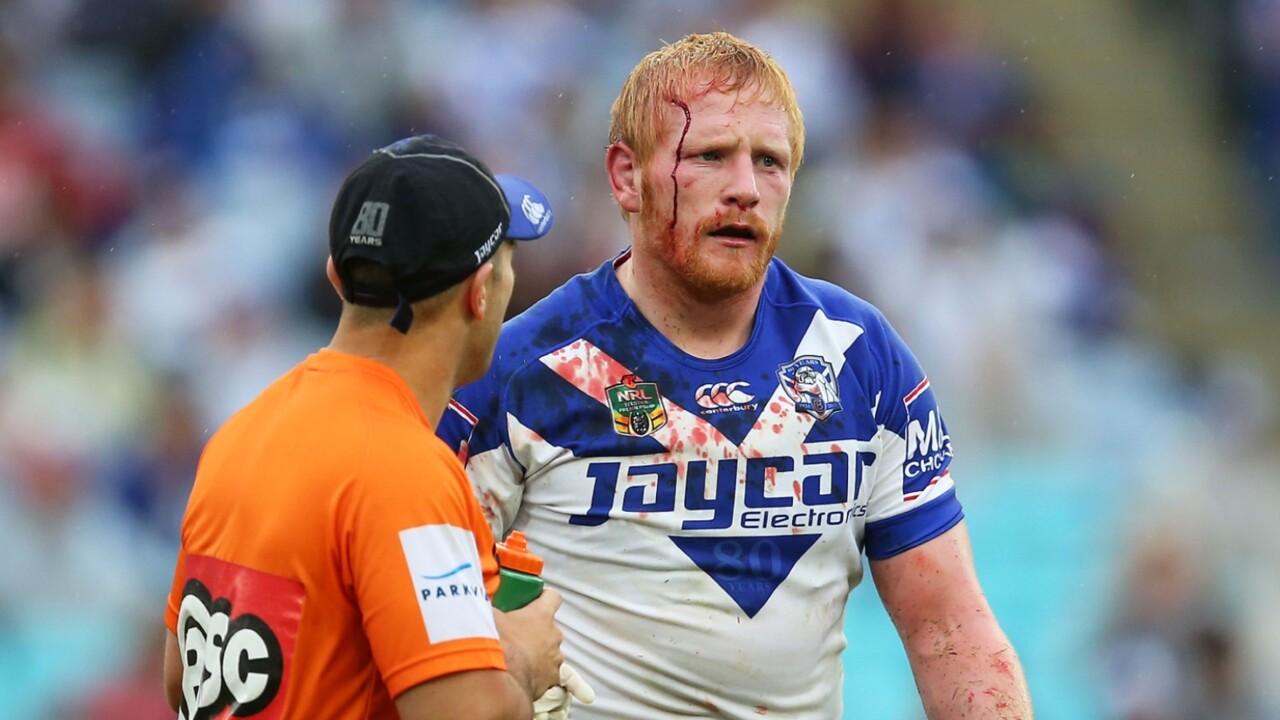Experts say concussed players should spend more time recovering on sideline
Experts call for sporting codes to stand down concussed footballers for four weeks and for an overhaul of concussion testing procedures.

Neurological experts have called for concussed footballers to be ruled out for at least four weeks, as the National Rugby League prepares to consider a mandatory stand-down period for concussion,
Adrian Cohen and Rowena Mobbs, both of whom spoke at the federal government inquiry into concussion this week, said concussed athletes should be sidelined for a minimum four weeks.
“Now, nothing in the professional players brain changes the day they sign a contract,” Dr Cohen said. “Their physiology doesn’t change. So there’s no reason why they should recover in one day and only need one day of rest rather than one week but that’s what has happened in the past.
“At the moment it is possible for an NRL footballer to be concussed one week and play the following week and nowhere has it been established that this is safe practice.

“Because the research shows that this is an injury that on average from the point of view of pathology … the reality is it probably should be closer to four weeks if you were going to make blanket rules for everybody to be safe.”
The inquiry was called after Englishman James Graham revealed the damage playing rugby league did to his brain as part of the groundbreaking six-part investigative podcast series Head Noise by the footballer and The Australian.
Graham received 100 concussions in 18,000 collisions across his 17-year playing career. A scan of his brain revealed shrinkage of his frontal lobe and parietal lobe and white lesions that indicated head trauma.

Dr Mobbs, a leading neurologist, said a minimum of four weeks was an appropriate time for players to be stood down with a head injury.
“It would be wise to take a more conservative approach given the potential for delayed symptoms and the mounting evidence of brain abnormalities well beyond two weeks in some players,” she said.
“A four-week benchmark seems reasonable. In my clinical practice that is what I encourage.”
Dr Cohen, who specialises in head and neck injuries, has created a device called Nurochek, which is designed to detect concussion and individualise an athletes recovery.
The NRL is considering trialling Nurochek, which has already been used in amateur rugby union, rugby league and Australian rules.


Dr Cohen, who told the parliamentary inquiry this week that the current concussion protocols used by the major sporting codes, such as traditional SCAT tests that require players to go through a memory test and be physically assessed, are dated.
“They’re woefully inadequate,” he said. “We’re so used to this terminology now when we look at our television: ‘Oh, he’s gone for an HIA. Oh, they’re going to have the SCAT test.’ It’s like people think Moses came down from Mt Sinai with these tablets with the HIA written on them. It’s a terrible test, and everybody knows it’s a terrible test.”
Dr Cohen says his test, or other independent tests using technology, would stop players from faking they were OK to play on and take the decision out of a footballer’s hands. It would also help individualise people’s recovery from concussion.
“With Nurochek, we flash a light into the eyes of the person being tested and we record the brain’s electrical activity. And the beauty of this is that it’s objective,” he said. “It’s not ‘how many fingers am I holding up?’ Or ‘are you OK?’ Because we know players are motivated to get back on the field.
“In the NRL’s own polling of players, they found that over half the players admitted to lying about the fact that they had no symptoms. What we do is a test on the individual, and it delivers a result that says either you’re OK or you’re not.”








To join the conversation, please log in. Don't have an account? Register
Join the conversation, you are commenting as Logout